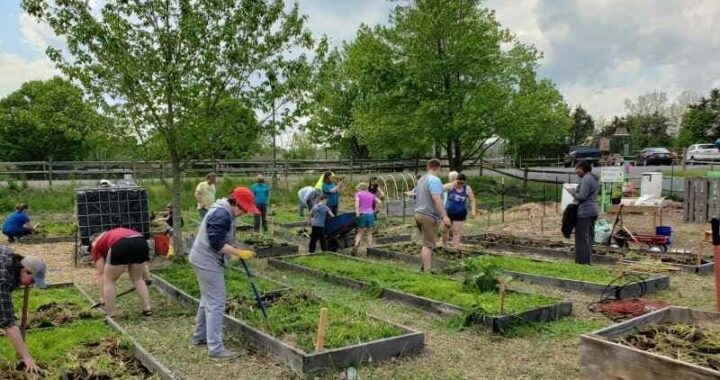By Gabrielle Sanderson
Do you know what a food desert is? A food desert is an urban area where is it difficult to buy affordable, or good-quality fresh food. You may be shocked to know that there are many of these, right here in Virginia! The town of Strasburg has a food desert that encompasses 90% of its community. Two conservation specialists, from the Lord Fairfax Soil and Water Conservation District, decided to address this food desert dilemma by building a grant-funded Strasburg Community Garden, which opened in the Spring of 2018.
Alison Sloop and Nick Livesay, the conservation specialists, applied for a grant from the National Association of Conservation Districts in the summer of 2017. “One of the main parts of the grant is having a bunch of educational workshops to show people how to prune and harvest correctly, how to water gardens efficiently, and to empower people who are intimidated by starting a garden in their own community,” said Sloop. The Extension Master Gardeners are important for that aspect of the grant.
The 5,200-square-foot community garden has a no-till policy, features the best management practices for sustainability, and will be handicap friendly. With this garden being environmentally and sustainably conscious, there are a lot of partners and supporters, from Virginia Cooperative Extension, local schools, the Boy Scouts, churches and even the Northern Shenandoah Valley Master Gardeners. Volunteers, including the Extension Master Gardeners, carried out a method of sheet mulching to help preserve the soil structure and created a rain barrel at a source that can produce up to 500 gallons of water. Two Boy Scouts also helped to construct six wheel-chair accessible beds for their Eagle Scout Awards.
Mark Sutphin, the Unit Coordinator of Frederick County, states that several Extension Master Gardeners are presenting at the educational lectures and workshops, which will serve as a guide for those people who are interested in gardening, but do not know how to begin.
Rebeca Davis, Family and Consumer Science agent for Frederick County, is helping with the production of the educational sessions, food preservation workshops, and food demos using harvest from the gardens.
Kimberly Cost, the Expanded Food and Nutrition Education Program Assistant, for the summer and fall in conjunction with this community garden. Sutphin states that, “Kim will try to incorporate recipes into her programs that utilize items seasonally available in the community garden, aiding the participants in knowing how to use the produce grown.”
“The garden coupled with educational lectures, as well as hands-on workshops in and out of the garden will help aid plot holders and other community members to gain the knowledge to be confident and successful at growing some of their own produce,” says Sloop.
While Sloop makes it clear that the Strasburg Community Garden is not mandating a certified organic status, the best management practices of sustainability are still encouraged. Sloop mentions that she encourages people to add things to their gardens that reduce the use of herbicides or pesticides. “I know there are some beneficial insects that eat the seeds of invasive pests,” Sloop jokes. “We encourage people when they’re having a plant or pest issue to contact the Extension Master Gardeners or the District to help formulate a plan to help their plants in more organic way.”
Even though this garden just got started, it will only continue to grow. Sutphin states that, “one of the demo gardens will be a children’s garden with sensory interactive plants for kids to touch, see, and smell.” Sutphin mentions that Rozalynn McIntosh, who is the Extension Master Gardener leader for the Master Gardener demo plot, will be making this a class project for the 2018 Extension Master Gardener Training Class.
The community garden is involving numerous different age groups from the community, such as: the kids with the community garden, the handicapped plots for the disabled, and others that just want to learn. The excitement and the involvement within the community continues to expand. This shows that just a simple act of helping the community to be aware that they can grow their own food can make such a difference.
“We know there are a lot of people interested in gardening. We just want to be a resource for those people,” says Sloop.
For more information on the Strasburg Community Garden, please see their Facebook page.

